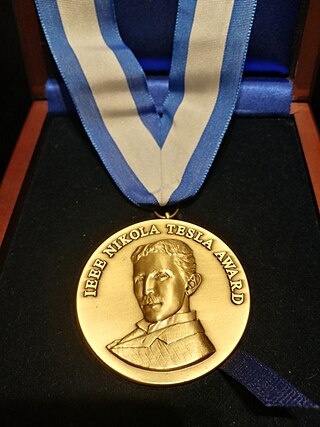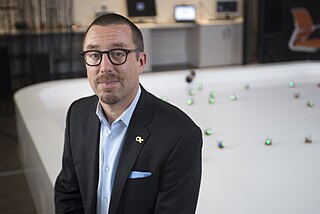
Rudolf Emil Kálmán was a Hungarian-American electrical engineer, mathematician, and inventor. He is most noted for his co-invention and development of the Kalman filter, a mathematical algorithm that is widely used in signal processing, control systems, and guidance, navigation and control. For this work, U.S. President Barack Obama awarded Kálmán the National Medal of Science on October 7, 2009.
Thomas Kailath is an Indian born American electrical engineer, information theorist, control engineer, entrepreneur and the Hitachi America Professor of Engineering emeritus at Stanford University. Professor Kailath has authored several books, including the well-known book Linear Systems, which ranks as one of the most referenced books in the field of linear systems.
Petar V. Kokotovic is professor emeritus in the College of Engineering at the University of California, Santa Barbara, USA. He has made contributions in the areas of adaptive control, singular perturbation techniques, and nonlinear control especially the backstepping stabilization method.

The IEEE Nikola Tesla Award is a Technical Field Award given annually to an individual or team that has made an outstanding contribution to the generation or utilization of electric power. It is awarded by the Board of Directors of the IEEE. The award is named in honor of Nikola Tesla. This award may be presented to an individual or a team.

Brian David Outram Anderson is Professor in the Research School of Information Sciences and Engineering at the Australian National University. His research interests include circuits, signal processing and control, and his current work focuses on distributed control of multi-agent systems, sensor network localization, adaptive and non-linear control. Professor Anderson served as President of the Australian Academy of Science from 1998 to 2002.

Magnus B. Egerstedt is a Swedish-American roboticist who is the Dean of the Henry Samueli School of Engineering at the University of California, Irvine. He was formerly the Steve C. Chaddick School Chair and Professor at the School of Electrical and Computer Engineering, Georgia Institute of Technology.
Michael Athans was a Greek-American control theorist and a Professor Emeritus in the Department of Electrical Engineering and Computer Science at the Massachusetts Institute of Technology. He was a Fellow of the IEEE (1973) and a Fellow of the AAAS (1977). He was the recipient of numerous awards for his contributions in the field of control theory. A pioneer in the field of control theory, he helped shape modern control theory and spearheaded the field of multivariable control system design and the field of robust control. Athans was a member of the technical staff at Lincoln Laboratory from 1961 to 1964, and a Department of Electrical Engineering and Computer Science faculty member from 1964 to 1998. Upon retirement, Athans moved to Lisbon, Portugal, where he was an Invited Research Professor in the Institute for Systems and Robotics, Instituto Superior Técnico where he received a honoris causa doctorate from the Universidade Técnica de Lisboa in 2011.

S. Shankar Sastry is the Founding Chancellor of the Plaksha University, Mohali and a former Dean of Engineering at University of California, Berkeley.

Mark W. Spong is an American roboticist. He is a professor of systems engineering and electrical and computer engineering in the Erik Jonsson School of Engineering & Computer Science at the University of Texas at Dallas (UTD). He served as dean of the Jonsson School and the Lars Magnus Ericsson Chair in Electrical Engineering from 2008 to 2017. Before he joined UTD, he was the Donald Biggar Willett Professor of Engineering, professor of electrical engineering, research professor of Coordinated Science Laboratory and Information Trust Institute, and director of Center for Autonomous Engineering Systems and Robotics at the University of Illinois at Urbana-Champaign.
Vijay Kumar is an Indian roboticist and UPS foundation professor in the School of Engineering & Applied Science with secondary appointments in computer and information science and electrical and systems engineering at the University of Pennsylvania, and became the new Dean of Penn Engineering on 1 July 2015.
Richard D. Braatz is the Edwin R. Gilliland Professor at the Massachusetts Institute of Technology known for his research in control theory and its applications to chemical, pharmaceutical, and materials systems.

Mathukumalli VidyasagarFRS is a leading control theorist and a Fellow of Royal Society. He is currently a Distinguished Professor in Electrical Engineering at IIT Hyderabad. Previously he was the Cecil & Ida Green (II) Chair of Systems Biology Science at the University of Texas at Dallas. Prior to that he was an executive vice-president at Tata Consultancy Services (TCS) where he headed the Advanced Technology Center. Earlier, he was the director of Centre for Artificial Intelligence and Robotics (CAIR), a DRDO defence lab in Bangalore. He is the son of eminent mathematician M V Subbarao.
Masayoshi Tomizuka is a professor in Control Theory in Department of Mechanical Engineering, University of California, Berkeley. He holds the Cheryl and John Neerhout, Jr., Distinguished Professorship Chair. Tomizuka received his B.S. and M.S. degrees in mechanical engineering from Keio University, Tokyo, Japan in 1968 and 1970, and his Ph.D. in mechanical engineering from the Massachusetts Institute of Technology in February 1974. He was elected to the National Academy of Engineering in 2022.
Chen Wen-tsuen is an ethnic Taiwanese computer scientist, a distinguished research fellow at the Academia Sinica and a lifelong national chair of the Ministry of Education, Taiwan. From 2006 to 2010, he was the president of the National Tsing Hua University, a premier research university in Taiwan.
Graham Clifford Goodwin is an Australian Laureate Professor of Electrical Engineering at the University of Newcastle, Australia.
Kenneth A. Loparo is Nord Professor of Engineering and Chair of Department of Electrical Engineering and Computer Science at the Case Western Reserve University, OH, USA, where has been affiliated with since 1979. He was an assistant professor in the Mechanical Engineering Department at Cleveland State University from 1977 to 1979.
Mengchu Zhou is a Chinese-American Distinguished Professor of electrical and computer engineering in the Helen and John C. Hartmann Dept. of Electrical and Computer Engineering at New Jersey Institute of Technology (NJIT) and at Macau University of Science and Technology. He is the Chairman of IKAS Industries of Shenzhen in China and a Board Member of OneSmart Education Group headquartered in China.
Frank L. Lewis is an American electrical engineer, academic and researcher. He is a professor of electrical engineering, Moncrief-O’Donnell Endowed Chair, and head of Advanced Controls and Sensors Group at The University of Texas at Arlington (UTA). He is a member of UTA Academy of Distinguished Teachers and a charter member of UTA Academy of Distinguished Scholars.
Hassan K. Khalil is an Egyptian-born American electrical engineer. He was named Fellow of the Institute of Electrical and Electronics Engineers (IEEE) in 1989 for contributions to singular perturbation theory and its application to control.

Ali Galip Ulsoy is an academic at the University of Michigan (UM), Ann Arbor, where he is the C.D. Mote Jr. Distinguished University Professor Emeritus of Mechanical Engineering and the William Clay Ford Professor Emeritus of Manufacturing.







